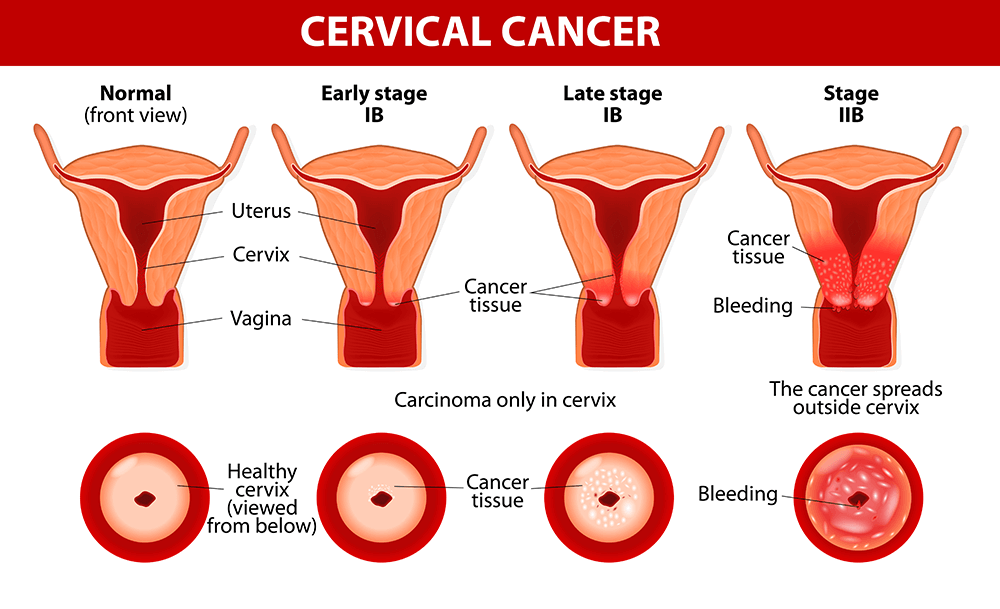Cervical Cancer Screening

A cervical cancer screening is used to detect changes in the cells of the cervix or vaginal tissue that can lead to cancer prior to a person having any symptoms. Looking for cancer can help find it at an early stage, when it may be easier to treat. Cervical cancer screenings through pap smears typically begin at the age of 21.
Cervical cancer occurs when cervical cells become abnormal and grow out of control. The cancer cells invade deeper into the tissue and can spread to other organs in the body.
CERVICAL CANCER FACTS
Most cervical cancer is caused by an human papillomavirus (HPV) infection. HPV is a virus that enters cells and can cause them to change. Some types of HPV have been linked with cervical, vulvar, vaginal, penial, anus, mouth, and throat cancers. Types of HPV that may cause cancer are known as “high-risk.”
The Sexual Activity Factor
HPV is passed from person to person during sexual activity. It is a very common virus and most people who are sexually active will get an HPV infection in their lifetime. There are no symptoms with HPV. Most HPV infections go away on their own.
Leading to Cancer
Short term infections cause only mild changes (low-grade) in cervical cells. The cells will go back to normal as the HPV infection clears. In some women, HPV does not go away. High risk HPV infections last for a long time and can cause high-grade changes in cervical cells. High-grade changes are more likely to lead to cancer though it usually takes 3-7 years for high-grade cervical cells to turn into cancer.
RISK FACTORS

The following factors may raise a woman’s risk of developing cervical cancer:
- Multiple sexual partners
- Having a male sexual partner who has had multiple sexual partners
- Early age at which you first had sex (younger than 18 years)
- A personal history of dysplasia of the cervix, vagina, or vulva
- A family history of cervical cancer
- Certain sexually transmitted infections like chlamydia, genital herpes or HPV
- Immune system deficiency
- Smoking
- Risk increases with age
- Race/Ethnicity – more common among black, Hispanic and Native American women.
- Exposure to diethylstilbestrol (DES) given during pregnancy to prevent miscarriage.
Source: acog.org
SIGNS OF CERVICAL CANCER
Signs of cervical cancer vary but the following signs should be addressed with a Rosemark obgyn doctor.
Early Signs:
- Abnormal bleeding, spotting, or watery discharge from the vagina.
- Heavier than usual menstrual bleeding
- Bleeding after sex
Advanced Signs
- Pelvic pain
- Problems urinating
- Swollen legs
- Presence of tumors in nearby organs or lymph nodes
Source: acog.org
CERVICAL CANCER PREVENTION
To prevent cervical cancer there are a few things that can be done. First, avoid exposure to HPV through abstinence or use of condoms. Second, avoid smoking. Third, get an HPV vaccination. Finally, a well-proven way to prevent cervical cancer is to have cervical cancer screening to identify pre-cancers before they become invasive cancer.
CERVICAL CANCER SCREENING
 A pap smear is the most commonly used screening tool for cervical cancer. A pap test is a procedure to collect cells from the surface of the vagina or cervix. A speculum is inserted into the vagina to widen it. Then a brush is used to gently scrape cells from the vagina and cervix. The cells are placed into a pathology bottle specifically designed for cervical or vaginal testing. The Pap smear is sent off to a pathologist who looks at the cells under a microscope to check if they are abnormal. An HPV test may also be ordered along with a pap smear.
A pap smear is the most commonly used screening tool for cervical cancer. A pap test is a procedure to collect cells from the surface of the vagina or cervix. A speculum is inserted into the vagina to widen it. Then a brush is used to gently scrape cells from the vagina and cervix. The cells are placed into a pathology bottle specifically designed for cervical or vaginal testing. The Pap smear is sent off to a pathologist who looks at the cells under a microscope to check if they are abnormal. An HPV test may also be ordered along with a pap smear.
Which tests and how often cervical cancer screenings should be performed depend on your age:
- Women aged 21-29 years should have a pap test alone every 3 years. HPV testing is not recommended.
- Women aged 30-65 years should have a pap test and HPV testing every 5 years. It is also acceptable to have a pap test every 3 years.
- Women after age 65 can stop having cervical cancer screening if they do not have a history of moderate or severe abnormal cervical cells or cervical cancer, and if they have had either three negative pap test results in a row or two negative HPV in a row within the past 10 years, with the most recent one being in the last 5 years.
SUMMARY
A cervical cancer screening is an important part of female health as cervical cancer is preventable with appropriate screenings. If you have concerns about cervical cancer or feel that you may be at risk, call Rosemark for an appointment today! Seriously, don’t delay! Early detection saves lives!
